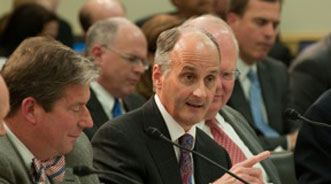NADA Board Member Warns Congress of Problems Multiple Fuel-Economy Standards Can Cause

By subscribing, you agree to receive communications from Auto Remarketing and our partners in accordance with our Privacy Policy. We may share your information with select partners and sponsors who may contact you about their products and services. You may unsubscribe at any time.
WASHINGTON, D.C. –
Alabama franchise dealer Forrest McConnell urged members of the U.S. House Energy and Commerce Subcommittee to be wary of the redundant set of three fuel-economy standards.
McConnell, who also serves of the board of directors for the National Automobile Dealers Association, told the committee Tuesday ineffective standards could hurt unit sales by increasing costs and restricting vehicle availability. The dealer believes the situation could directly create a negative effect on the nation’s fragile economic recovery and curtail job creation.
To rectify the situation, McConnell advised Congress to return to a single standard that takes into account national factors such as jobs, safety and consumer demand as it could more effectively increase fuel savings, enhance economic growth and protect the environment.
“Auto dealers support fuel-economy increases, but federal regulators must realize the health of the U.S. economy and job growth hinges on the success of auto manufacturing and auto retailing,” stated McConnell, who testified on behalf of NADA.
“Allowing the auto industry to offer new vehicles that are affordable and in demand — and most important, more fuel-efficient — will increase fuel savings, cut greenhouse gas emissions and create jobs,” he added.
Currently, NADA explained automakers must comply with three different programs administered by the National Highway Traffic Safety Administration, the Environmental Protection Agency and the California Air Resources Board.
Subscribe to Auto Remarketing to stay informed and stay ahead.
By subscribing, you agree to receive communications from Auto Remarketing and our partners in accordance with our Privacy Policy. We may share your information with select partners and sponsors who may contact you about their products and services. You may unsubscribe at any time.
Even though the Obama administration sought to “harmonize” the standards between the agencies through 2017 under a national program, McConnell noted that all three programs have different compliance schemes.
“Duplicative and sometimes conflicting rules could increase the cost of a new car or truck and may limit the availability of certain models,” the dealer told the Congressional committee before asking, “How is that good for the consumer?”
McConnell then wanted the House members to consider several other questions.
“If car buyers delay new-vehicle purchases and choose to hold onto their older car longer, how is that good for the environment? How is that good for job creation?” McConnell implored.
“Only through a single, national standard established by NHTSA — which Congress originally chose to set fuel economy — will there be carefully planned and beneficial reductions in greenhouse gas emissions and cut this nation’s dependence on foreign oil without hindering the economic recovery or contributing to job losses,” the Honda dealer from Montgomery, Ala., suggested.
“Congress should exercise its authority to put common sense and thoughtful policy back into the driver’s seat of the fuel-economy debate,” McConnell went on to say.
An executive summary of NADA’s stance on fuel-economy standards is available here. McConnell’s complete Congressional testimony can be found here.


